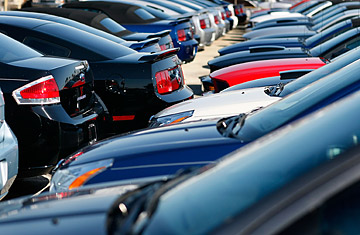
Vehicles on the sales lot at the Metro Ford dealership in Miami
Auto sales plummeted again in January, falling to their lowest level in decades, as showroom traffic dropped by almost half and loans dried up even for interested consumers. The slowdown leaves the U.S. car industry at another historic crossroads. America has long served as the world's largest market for new cars. But Mike DiGiovanni, General Motors' director of global analysis, says more new vehicles were sold in China last month than in the U.S. The Chinese bought 760,000 vehicles, pushing that country's annual sales to 10.7 million units — greater than the current U.S. annual volume of 10 million. By contrast, in 2007, some 16 million vehicles were sold in North America. (See pictures of the global financial crisis.)
The U.S. slide hit seven of the top eight American, Asian and European manufacturers, who account for almost 90% of all the cars sold in the U.S. Each reported a double-digit sales decline. For Detroit's ailing automakers, the numbers were nothing short of apocalyptic: Chrysler's sales dropped 55%, GM's 48% and Ford Motors' almost 40%. Even Japan's big brands were hammered: Toyota's sales shrunk 34%, Honda's 31% and Nissan's 30%, while Volkswagen of America fell 12%. Hyundai (Korea) escaped the carnage, reporting a 14% increase. Subaru also managed a modest increase for the second month in a row. "No auto company is immune from current market conditions," says Dick Colliver, executive vice president of sales for American Honda. "The industry is in a bottoming phase," suggests Toyota vice president Bob Carter, who doesn't see much hope for improvement before spring.
Chrysler vice chairman Jim Press argues that while the situation is dire, it is not hopeless. Part of the reason for the big decline in Chrysler's sales, he says, was the company's decision to forgo sales to fleet customers. Fleet sales tend to be low-profit or loss leaders. Chrysler fleet sales last month declined 80% to fewer than 2,000 units. However, Press, who was one of the more optimistic auto executives when he headed Toyota's North American operations, says carmakers have no choice but to adjust to the recession-depressed annual sales rate of around 10 million units in the U.S.
To expedite their restructuring, GM and Chrysler offered buyouts to a total of 92,000 blue collar workers this week. Ford is expected to follow suit. "We've cut one-third of our capacity and taken out $13 billion in fixed costs," notes Press. Honda, Nissan and Toyota have slashed production at their plants as well, but the Japanese companies are not in a do-or-die situation. Press also notes that Chrysler's survival plan calls for another $3 billion in direct loans from the U.S. Treasury, low-interest loans from the Department of Energy under the 2007 Energy Act and concessions from the United Auto Workers, creditors, dealers and suppliers. Once that's in hand, he adds, then comes an alliance with the Italian carmaker Fiat.
GM's DiGiovanni says a turnaround hinges on better access to credit for consumers and improvement in the housing market. "We've got to stop foreclosures, and we've got to stop the declines in home prices," he says. Showroom traffic dropped 40% last month, and the shoppers who did show up found it difficult to finance, notes Jesse Torpak, an analyst with Edmunds.com, a website for car-buying. One added complication: the drop in used-car prices — the Manheim Consulting Index on used-car prices has dropped more than 11% in the past year — means that buyers effectively have to pay more.
Where's the trough? Ford economist Emily Kolinski-Morris says that while the bottom of a market is impossible to predict, there are signs of improvement, such as a two-point increase in a recent consumer-confidence index and the stabilization of retail vehicle sales over the past four months, albeit at a very low level of 8.3 million units. The automakers also believe that pent-up demand will eventually kick in.
For Ford, the domestic company considered to be in the best shape, a turnaround this year is critical. Says Efraim Levy, an analyst with Standard & Poor's Equity Research in New York: "Though Ford estimates that it again gained retail market share, if 20% [to] 30% retail declines persist, it would be more difficult, in our view, for [Ford] to avoid accepting government loans. Even with a boost from the anticipated federal stimulus plan, we see consumers taking a cautious approach to large-ticket discretionary purchases." And there's nothing more big-ticket than an automobile.
